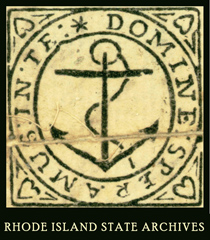Historical note
The State of Rhode Island first became aware of the need for formal education of the deaf in 1836 when the General Assembly directed town clerks to report the number, age, sex, and economic status of deaf persons, and the extent of their education. The response showed that there were 51 persons so afflicted, 21 males and 30 females. Five of these were educated at the American Asylum at Hartford, Connecticut; eleven were partially educated and thirty five were without education.
Most were being supported by their families and the majority were destitute. Rhode Island started subsidizing the education of the deaf in 1845 and all the education that the children received was at the American Asylum until 1873 when legislation was enacted permitting the placement of a deaf child at the Horace Mann Day School in Boston.
The establishment of a school in Rhode Island was done solely through the efforts of Mrs. Henry Lippitt, mother of a deaf girl, Jeanie Lippitt. Mrs. Lippitt probably had more to do with the establishment of oralism in this country than any other person. Mrs. Lippitt was determined that her daughter be taught to speak. She could not find a school that taught both lip reading and speech so she taught Jeanie herself, inventing her own method as she went along. It was the results of Mrs. Lippitts hard, imaginative work and Jeanie’s achievements that influenced Mrs. Harriet B. Rodgers to recognize the potential of lip reading for the deaf. Mrs. Rodgers later founded the Clarke School.
Among Jeanie’s later teachers were Miss Mary C. Wheeler, who later founded the now prestigious Mary C. Wheeler School in Providence (some of our own students have taken courses there), and Henry Wadsworth Longfellow. She went to Papantis Dancing School in Boston and danced with the wife of Theodore Roosevelt, among others. She was very friendly with Mabel Hubbard, who later became the wife of Dr. Alexander Graham Bell. Mabel, who was also deaf, was taught by Mrs. Lippitt. Jeanie later went to Dr. Bell for voice training lessons. Dr. Bell had to discontinue these to devote himself to the development of the talking machine. The first message on the telephone was sent from the stage of the old Providence Theatre by Dr. Bell and Mr. Hubbard to Boston. Jeanie was on the stage with Dr. Bell. Television was Dr. Bells idea - so that his wife and Jeanie could do their own talking over the phone. He never fully developed it, however. Mrs. Lippitt established a school for the deaf in Rhode Island in 1876. The state, through her efforts and the efforts of her husband, the Governor, took over the school in 1877. Joseph Warren Homer was the first Principal. The school opened with five pupils. Nine people have headed the Rhode Island School for the Deaf since its inception. Each person left his or her unique contribution.


